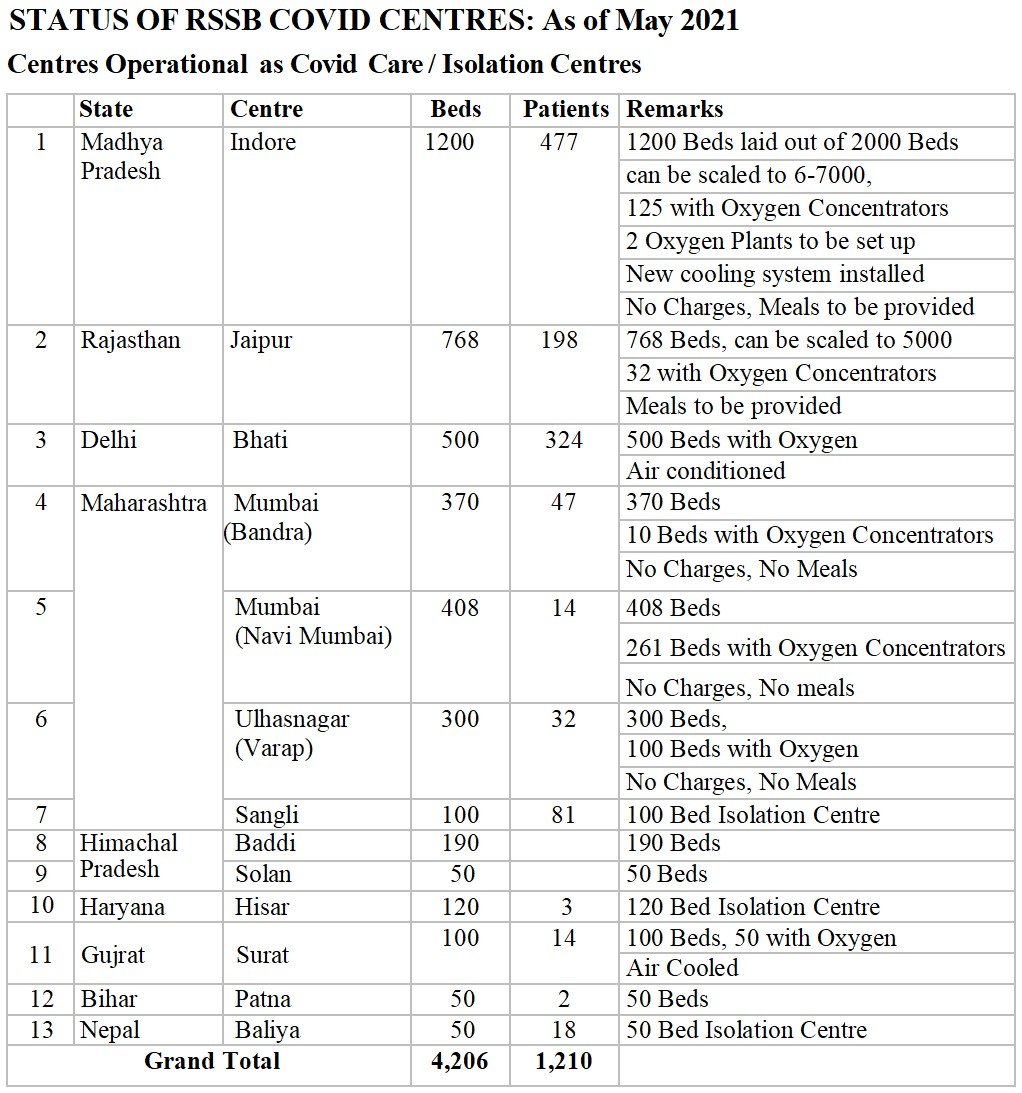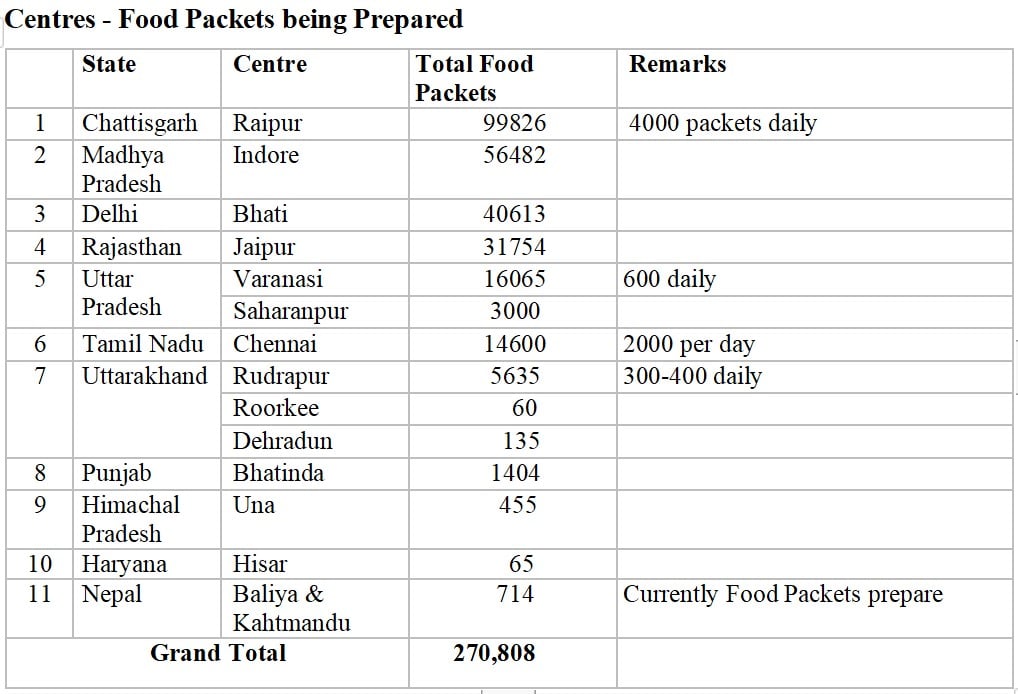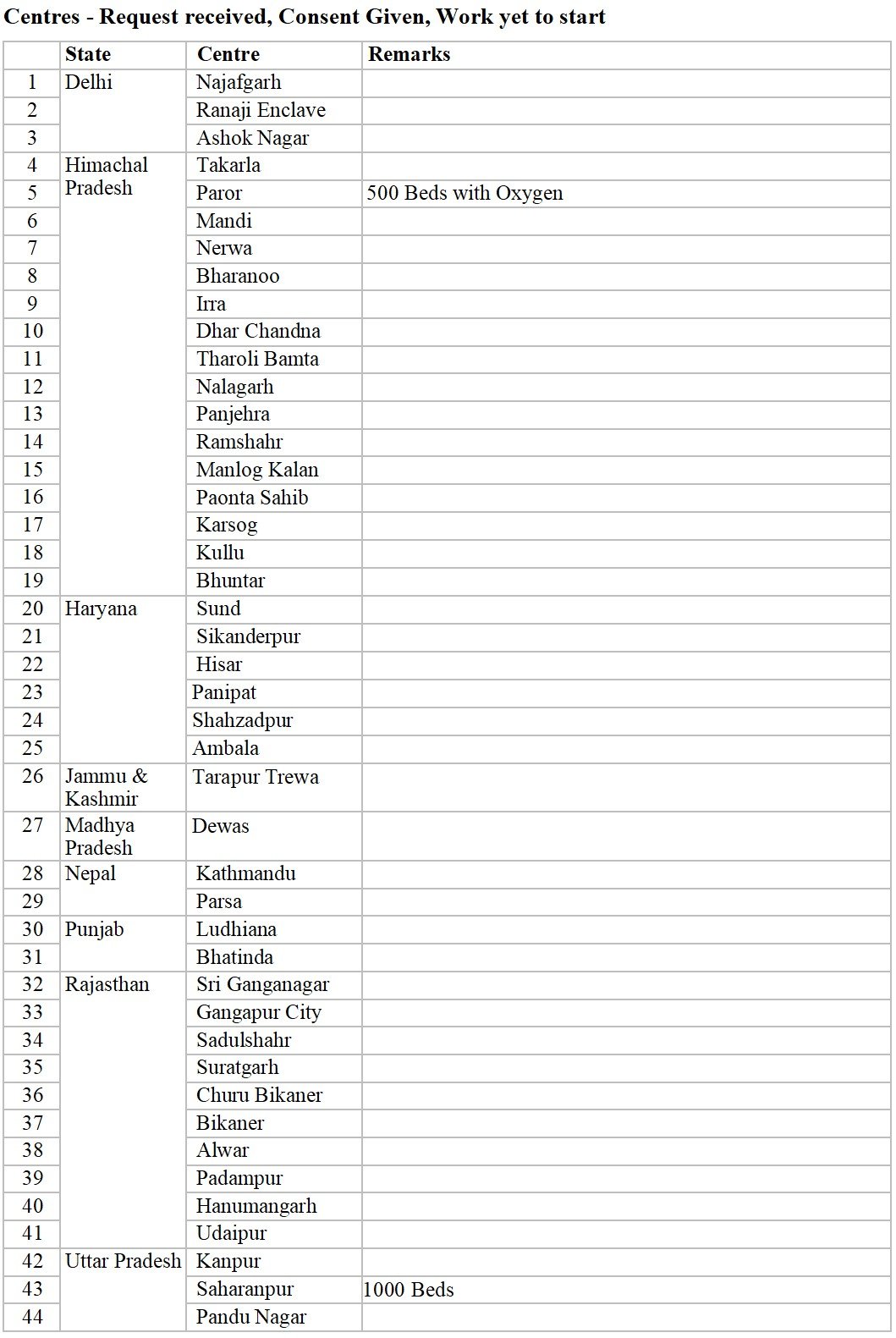Covid-19 Special Reports
Contents
Use of Vaccines for Covid-19
There is a lot of confusing information on the internet about the vaccines developed to immunize us against the Covid-19 virus. There is also an abundance of misinformation which can obscure the factual information. When it comes to the problems we face in life, we satsangis – like everyone else – must make our own decisions. It is neither practical nor desirable for Dera to give specific instructions on every ambiguous issue that arises. As a general guideline, the Master is not against vaccines. He supports the use of vaccines to protect ourselves against the Covid-19 virus and he himself has been vaccinated, as have Dera residents and sevadars. Concerning the specifics of the various vaccines, it is up to us individually to decide. We must always try to have a balanced and practical approach based on our understanding of the Sant Mat principles, while avoiding too much unnecessary hair-splitting. On May 24, 2021 the World Health Organization reported 3.5 million deaths globally from Covid-19. The potential life-saving benefit of these vaccines should not be ignored.
Hindi
कोविड-19 वायरस से बचाव के वैक्सीनेशन को लेकर इंटरनेट पर उलझन से भरी तरह-तरह की जानकारी उपलब्ध है। साथ ही इतनी ग़लत जानकारी पढ़ने को मिलती है जो असली तथ्यों को ही छुपा देती है। जब ऐसी जानकारी का संबंध उन समस्याओं से होता है जो हम ज़िंदगी में झेल रहे हैं, तो और लोगों की तरह, हम सत्संगियों को भी अपने फ़ैसले ख़ुद लेने होंगे। डेरे के लिए न तो यह संभव है, न ही सही है कि हर अस्पष्ट मुद्दे पर ख़ास निर्देश जारी करे। मुख्य बात यह है कि सतगुरु वैक्सीनेशन के खिलाफ़ नहीं हैं। अपने आप को कोविड-19 वायरस से बचाने के लिए वे वैक्सीनेशन के समर्थन में हैं। उन्होंने ख़ुद वैक्सीनेशन लगवाई है; साथ ही डेरा निवासियों और सेवादारों को भी वैक्सीनेशन दी गई है। जहाँ तक बात अलग-अलग वैक्सीनेशन की विशेषताओं की है, इसका निर्णय आपको ख़ुद लेना है। संतमत उसूलों के अनुसार हमें ज़िंदगी में हमेशा संतुलन बनाने की कोशिश करनी है और व्यावहारिक नज़रिया अपनाना है; न कि बेवजह बाल की खाल उधेड़ने में लगना है। वर्ल्ड हैल्थ ऑर्गनाइज़ेशन (World Health Organization) की सूचना के अनुसार 24 मई, 2021 तक दुनिया में 35 लाख लोगों की कोविड-19 से मौत हो चुकी है। इसलिए वैक्सीन द्वारा जान बचाने के फ़ायदे और संभावना को अनदेखा नहीं किया जा सकता।
Punjabi
ਇੰਟਰਨੈਟ ਉੱਤੇ ਕੋਵਿਡ-19 ਵਾਇਰਸ ਵਾਸਤੇ ਸਾਨੂੰ ਇਸ ਰੋਗ ਦੇ ਬਚਾਅ ਲਈ ਬਣੀਆਂ ਵੈਕਸੀਨਾਂ ਬਾਰੇ ਬਹੁਤ ਸਾਰੀ ਉਲਝਾਊ ਜਾਣਕਾਰੀ ਉਪਲੱਬਧ ਹੈ। ਸਹੀ ਜਾਣਕਾਰੀ ਨੂੰ ਧੁੰਦਲਾ ਕਰਨ ਵਾਲੀ ਗ਼ਲਤ ਜਾਣਕਾਰੀ ਦੀ ਵੀ ਬਹੁਤਾਤ ਹੈ। ਜਿੱਥੋਂ ਤਕ ਜੀਵਨ ਦੀਆਂ ਉਲਝਣਾਂ ਨੂੰ ਸੁਲਝਾਉਣ ਦਾ ਸਵਾਲ ਹੈ, ਬਾਕੀ ਲੋਕਾਂ ਵਾਂਗ ਸਾਨੂੰ ਸਤਿਸੰਗੀਆਂ ਨੂੰ ਵੀ ਖ਼ੁਦ-ਮੁਖ਼ਤਿਆਰ ਫ਼ੈਸਲੇ ਲੈਣੇ ਪੈਣਗੇ। ਡੇਰੇ ਵਾਸਤੇ ਹਰ ਅਸਪਸ਼ਟ ਵਿਸ਼ੇ ਨੂੰ ਸੁਲਝਾਉਣ ਲਈ ਖ਼ਾਸ ਹਿਦਾਇਤਾਂ ਦੇਣਾ ਨਾ ਤਾਂ ਸੰਭਵ ਹੈ ਅਤੇ ਨਾ ਹੀ ਉੱਚਿਤ ਹੈ। ਮੁਖ ਗੱਲ ਇਹ ਹੈ ਕਿ ਸਤਿਗੁਰੂ ਵੈਕਸੀਨ ਦੇ ਖ਼ਿਲਾਫ਼ ਨਹੀਂ ਹਨ। ਆਪ ਜੀ ਕੋਵਿਡ-19 ਤੋਂ ਆਪਣੇ ਆਪ ਨੂੰ ਸੁਰੱਖਿਅਤ ਕਰਨ ਵਾਸਤੇ ਸਾਨੂੰ ਸਮਰਥਨ ਦਿੰਦੇ ਹਨ ਅਤੇ ਆਪ ਜੀ ਨੇ ਖ਼ੁਦ ਵੀ ਵੈਕਸੀਨੇਸ਼ਨ ਕਰਵਾਈ ਹੈ ਅਤੇ ਡੇਰਾ ਨਿਵਾਸੀਆਂ ਅਤੇ ਸੇਵਾਦਾਰਾਂ ਨੂੰ ਵੀ ਕਰਵਾਈ ਹੈ । ਜਿੱਥੋਂ ਤਕ ਵੱਖ-ਵੱਖ ਵੈਕਸੀਨਾਂ ਦੀਆਂ ਖ਼ਾਸ ਵਿਸ਼ੇਸ਼ਤਾਈਆਂ ਦਾ ਸੰਬੰਧ ਹੈ, ਇਸ ਬਾਰੇ ਸਾਨੂੰ ਖ਼ੁਦ ਫ਼ੈਸਲੇ ਕਰਨੇ ਪੈਣਗੇ। ਸਾਨੂੰ ਹਮੇਸ਼ਾ ਸੰਤਮਤ ਦੇ ਅਸੂਲਾਂ ਨੂੰ ਮੁੱਖ ਰੱਖਦੇ ਹੋਏ ਆਪਣੀ ਸਮਝ ਮੁਤਾਬਕ ਇਕ ਸੰਤੁਲਿਤ ਅਤੇ ਅਨੁਭਵੀ ਰਸਤਾ ਅਪਣਾਉਣ ਦੀ ਕੋਸ਼ਿਸ਼ ਕਰਨੀ ਚਾਹੀਦੀ ਹੈ ਅਤੇ ਬੇਲੋੜੀ ਵਾਲ ਦੀ ਖੱਲ ਲਾਹੁਣ ਤਕ ਨਹੀਂ ਜਾਣਾ ਚਾਹੀਦਾ। 24 ਮਈ 2021 ਨੂੰ ਵਰਲਡ ਹੈਲਥ ਔਰਗੇਨਾਈਜੇਸ਼ਨ (World Health Organization) ਨੇ ਇਹ ਸੂਚਨਾ ਦਿੱਤੀ ਸੀ ਕਿ ਕੋਵਿਡ-19 ਤੋਂ ਸਾਰੇ ਸੰਸਾਰ ਵਿਚ 35 ਲੱਖ ਲੋਕਾਂ ਦੀ ਮੌਤ ਹੋ ਚੁੱਕੀ ਹੈ। ਸਾਨੂੰ ਜੀਵਨ ਦੇ ਬਚਾਅ ਲਈ ਇਨ੍ਹਾਂ ਵੈਕਸੀਨਾਂ ਦੇ ਫ਼ਾਇਦੇ ਦੀ ਸੰਭਾਵਨਾ ਨੂੰ ਨਜ਼ਰ-ਅੰਦਾਜ਼ ਨਹੀਂ ਕਰਨਾ ਚਾਹੀਦਾ।
COVID-19 Special Report
As a Special Consultant to the Economic and Social Council of the United Nations with respect to several areas of expertise including disaster relief, Radha Soami Satsang Beas has made a formal report to the United Nations outlining the activity undertaken by RSSB during the past few months to provide disaster relief in India to those affected by the COVID-19 virus pandemic. Below is the copy of the report.
The Privilege of Seva is a short documentary video showing how RSSB responded to the COVID19 pandemic throughout India, assisting a flood of struggling humanity in a time of need.
Story from the UN Civil Society COVID-19 Response: Story about Radha Soami Satsang Beas Covid-19 response. RSSB has consultative status with the UN ECOSOC.
RSSB Covid Response: This chart illustrates how RSSB in India gave support to the growing numbers of people affected by the Coronavirus.
Report to the United Nations
RSSB COVID-19 Pandemic Relief Effort
Radha Soami Satsang Beas (“RSSB”) is pleased to provide the following information to the United Nations. As a Special Consultant to the Economic and Social Council of the UN, it is one of the stated objectives of RSSB to provide relief to the needy in times of natural disaster. The COVID-19 pandemic has obviously given rise to the most extreme health and economic crisis in India and globally. RSSB realized at the outset that this was an opportunity to put its principles into practice.
Commencing on 26th March, 2020, RSSB began a program for the provision of daily food to those who were isolated in their homes. It was decided to prepare food packets at RSSB centres which local authorities could collect and distribute to those most in need. A typical parcel may contain a serve of vegetables, a serve of dal, a serve of spiced rice, some flat breads (roti) and some pickle. Each parcel is intended to provide a substantial and nutritious meal. The food is prepared every day from fresh ingredients. Teams of volunteers stay at a centre for a period of at least 14 days to prepare the food packets. The packets are delivered to the entry gate at each centre and the local authorities then take the food out into the communities for delivery. All this is done free of charge. The huge quantity of food required to keep up this production is all donated by followers of RSSB. The volunteers have been working under the difficult conditions of maintaining social distancing and intensive hygiene practices including the use of hand sanitizers, face masks and gloves. The number of food packets for distribution peaked at 1,176,000 packets per day around 4th May. As at 17th May, there were still almost 1 million packets being distributed per day.
On 30th March, the Prime Minister of India, Mr Modi, invited twelve religious heads to attend a video conference regarding the COVID-19 pandemic in India. Baba Gurinder Singh, as Patron of RSSB, attended the conference. He informed the meeting that RSSB was making all of its centres and facilities available to local government authorities to use as accommodation for migrant workers and as quarantine centres for patients.
“We are in touch with all the officials of the District Administration here; whether they are dealing with food or managing isolation wards or concerned with providing staying facilities for people. We have made arrangements for all kinds of facilities for everyone. In future also, whatever we have belongs to the sangat and for the sangat our doors shall always remain open,” Baba Ji said. He offered all RSSB premises to be available to the central government 24/7 for food, isolation wards and quarantine centres.
To help the Punjab state government in its concerted efforts to contain COVID-19, Baba Ji also offered to the Chief Minister of the Punjab, Captain Amarinder Singh, the use of all the RSSB Satsang centres located in the state.
In the centre at Kalmeshwar Road, Nagpur, RSSB provided a 5,000 bed quarantine facility. On 19th May, RSSB volunteered to provide free meals to the 9 other quarantine centres established by the Nagpur Municipal Corporation (NMC). The NMC had been spending around Rs200,000 a day to provide breakfast, lunch and dinner at these centres. RSSB will prepare all the food for free and deliver it to NMC daily.
At over 250 RSSB centres spread across India, every guest is provided with bedding, towels and toiletries, accommodated comfortably and provided three meals a day plus snacks, tea and so forth. People are welcomed purely on the basis of need without any discrimination on the basis of caste, race or religion. Of course, all migrant workers are able to continue with their daily religious practices as required by their faith, whatever that might be. Since many are locked down in these centres for weeks, RSSB volunteers organize daily yoga and the screening of videos addressing social and health issues such as the empowerment of women, organ donation, aids awareness, drug addiction, the harm caused by smoking, etc.. Facilities are available for children to play and some centres organized clowns, music and other entertainment for the children.
In the district around the headquarters at Beas, RSSB distributed face masks and hand sanitizer to local villages and also provided these items at its centres across India.
The number of people accommodated peaked at 23,788 around 16th May and was still over 20,000 on 17th May.
The following graph illustrates the sheer scale of the operation to provide food and accommodation:

Of course, in addition to the food packets and the accommodation for migrant workers and people who have been placed under quarantine, all the volunteers also have to be housed and fed.
As a direct way of supporting government efforts, RSSB donated Rupees 8 crore (US$1,050,000), being 80 million, divided as to 20 million (US$263,000) to The Prime Minister’s Relief Fund, and 10 million (US$131,500) to each of the governments of Punjab, Haryana, Delhi, Himachal Pradesh, Rajasthan and Jammu & Kashmir.
The three charitable hospitals operated by Maharaj Jagat Singh Medical Relief Society, an affiliated society of RSSB, being hospitals at Beas, Bhota and Sikanderpur, continued to provide free medical services to all comers during the virus lockdown. They also provided isolation facilities for suspected or positive cases of the virus infection. The Bhota hospital in Himachal Pradesh and part of the Beas hospital in Punjab were made available to the respective state governments for the care of COVID-19 patients.
In Chandigarh, the government relied upon the availability of RSSB sheds to provide urgent storage for mustard and wheat crops being harvested during the lockdown.
In many parts of India, migrant workers wanted to get home. In spite of government requests that they be paid and remain in the places where they had been working, thousands took to the roads to walk home because there was no road or rail transport. These desperate people were accommodated at RSSB centres wherever they reached. For those who kept going, many thousands were provided with food packets to help them on their way.
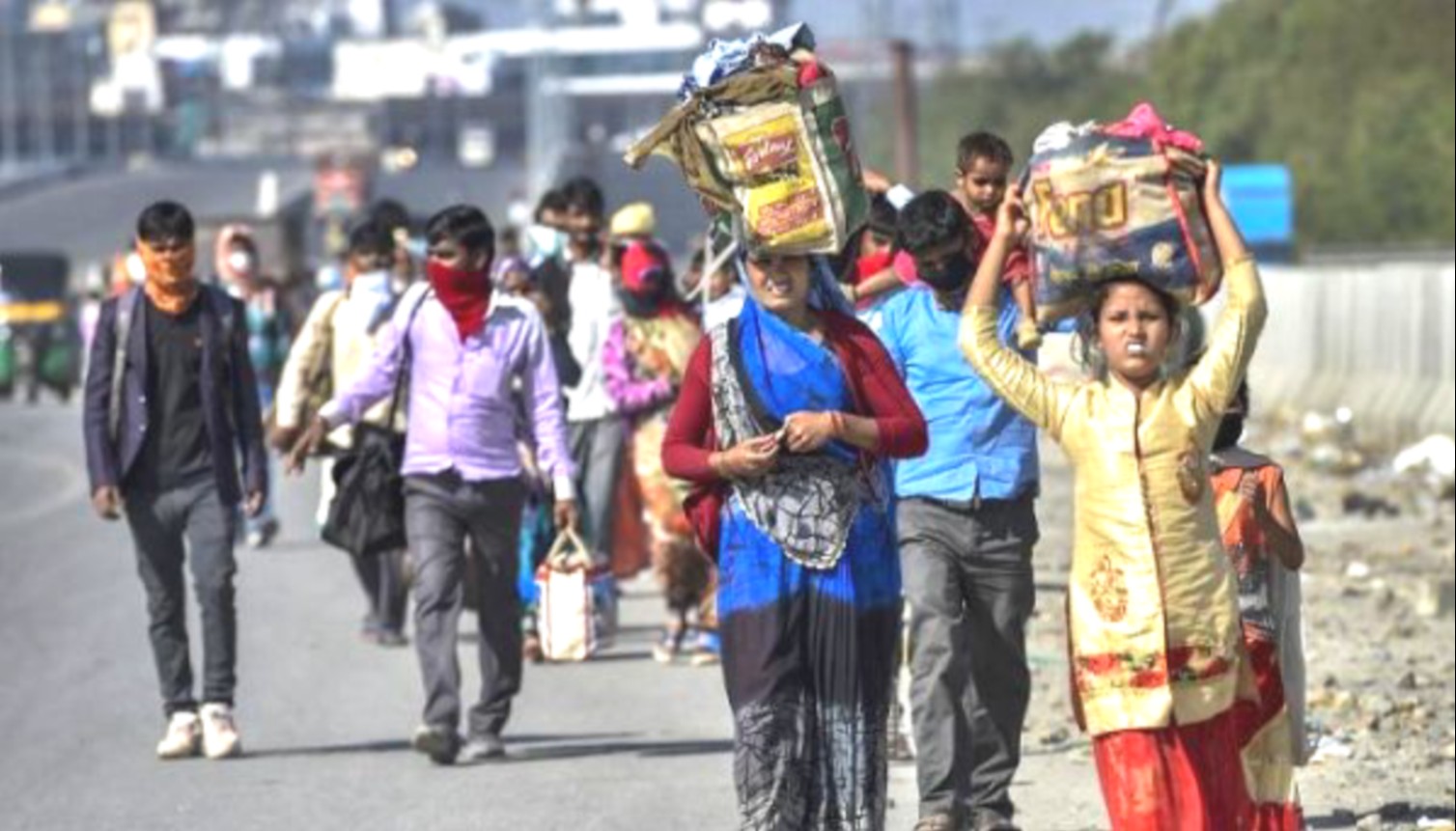
Examples of the various projects undertaken by RSSB
In Nagpur, RSSB worked with the Nagpur Municipal Corporation (NMC) to create one of the largest quarantine centres in India. The facility was completed in 8 days.
(Left) All Ready: A view of the 5,000 beds COVID Care Centre set up at Radha Soami Satsang Beas, Kalmeshwar Road, Nagpur. (Right) At ground zero: Municipal Commissioner Tukaram Mundhe on Monday inspecting facilities created at Radha Saomi Satsang Beas.
An article published on May 12, 2020 in “The Hitavada – The People’s Paper” commented as follows:
“The advantage with Radha Saomi Satsang Beas facility is that it is surrounded by thick green patch and the location outside the city ensures there is no threat to locals in anyway. The Trustees of Radha Saomi Satsang Beas apart from allowing use of their premises in battle against COVID-19 has also agreed to bear the cost of lodging and boarding.
Matting, barricading, compartments, siding, dome all was provided by the Trust. They have also told NMC officials that they would also provide drinking water facility apart from arranging food for the patients. NMC has put in place the required testing facility at Satsang premises wherein apart from checking temperatures, examination of blood samples would be conducted there only. In case the swab of any person in quarantine tests positive and the symptoms are mild then the treatment would be continued at the same premises but at separate room. The civic body would also bear the cost of lodging and boarding of medical staff. Arrangements for housing of medical, para medic, police personnel, employees engaged in sanitation work has also been made at the premises itself.
The 5000-bed COVID-19 Care Centre, which is located 15 km from the Nagpur city, is going to be used for quarantine facility and screening of suspected COVID-19 patients.
Soni, Public Relations Officer of NMC, said that this is the biggest quarantine centre in Maharashtra and one of the biggest in India. The Radha Soami Satsang Beas Centres are spacious and well equipped with hygienic kitchens and clean washrooms. Radha Soami Satsang Beas has provided mattresses, potable water and food for the patients.”
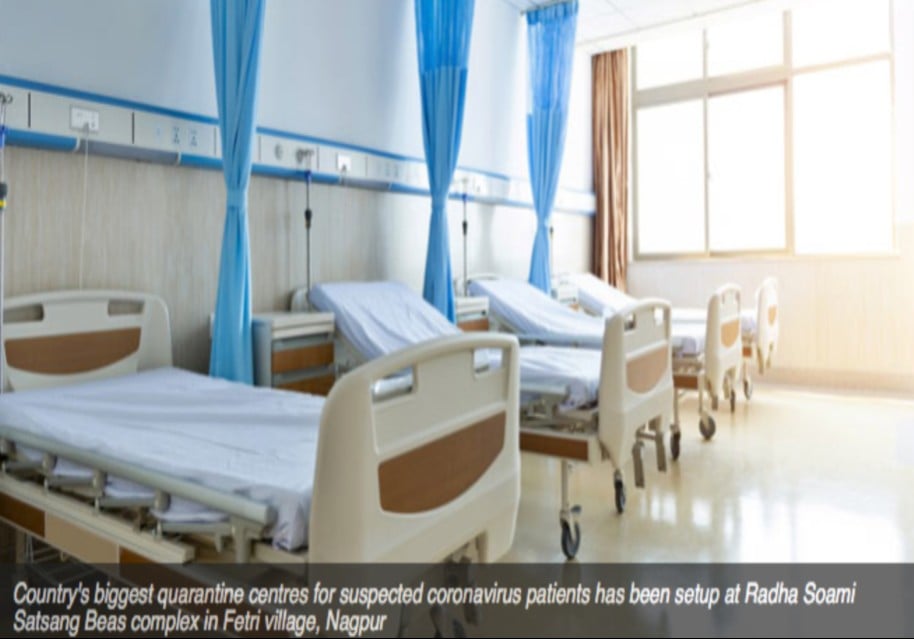
The press reported that:
“The Panchkula unit of Radha Soami Satsang Beas is organising food and shelter for stranded people. Adhering to all norms of social distancing and sanitization, society is helping thousands amid COVID-19 outbreak. It is also distributing food packets to 13,000 on an everyday basis. The services are not restricted to one centre or one city. But Radha Soami Satsang Beas has its relief and food facilities running across the country. Its role has been instrumental in comforting and feeding the needy amid a global health crisis. The society is at the forefront along with other organisations in the nation's fight against COVID-19.”
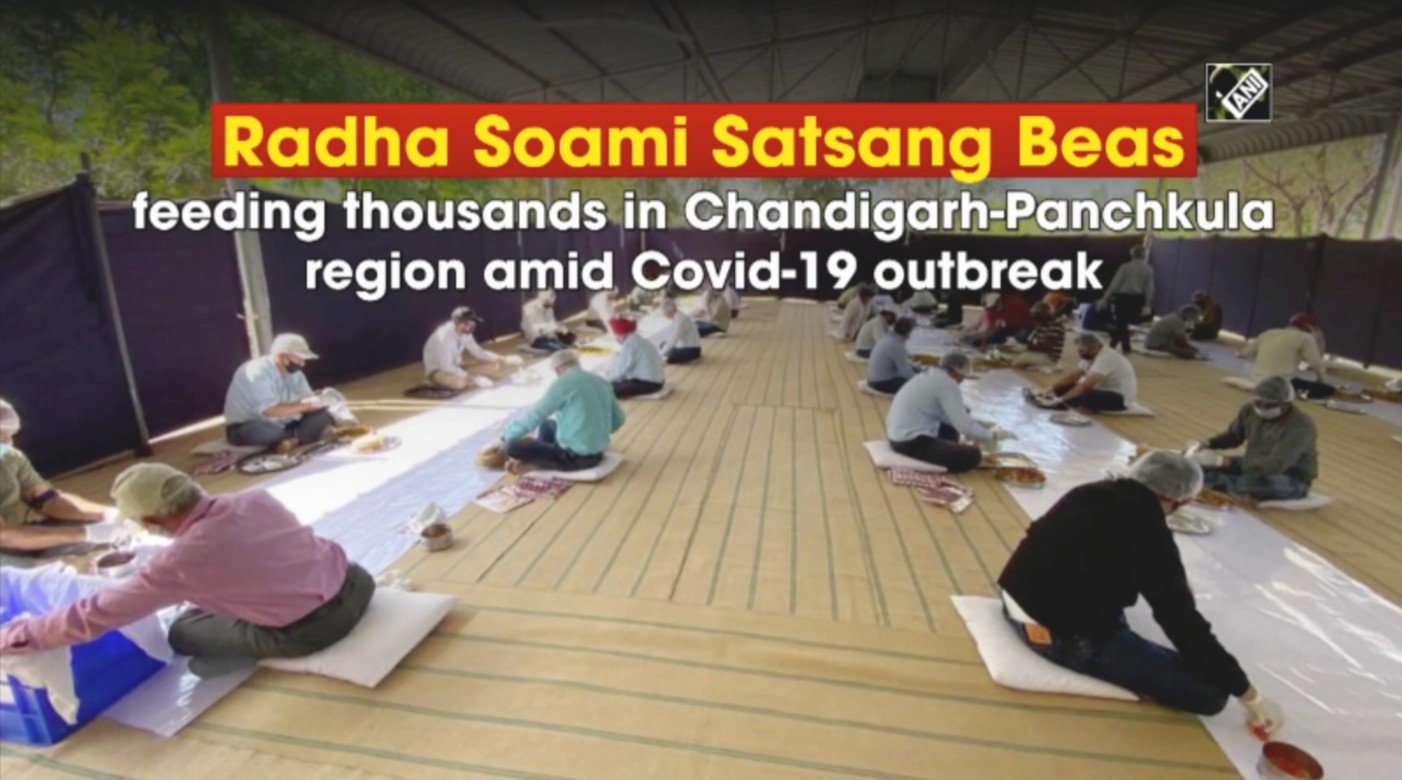
PTC news reported that:
“Punjab CM Captain Amarinder Singh on Tuesday 28th April announced a compulsory 21-day state quarantine for all those returning to the state from other places to check the further spread of coronavirus. He also announced that the Radha Soami Satsang Deras will be used as a quarantine facility for the Sikh pilgrims and students returning from the other states. All pilgrims returning from Nanded, and students and labourers coming from Rajasthan, will be stopped at the border and sent to Government quarantine centres to ensure that they do not mix with other people for 21 days, said the Chief Minister. Adding, he said that Radha Soami Satsang Deras would also be used to quarantine these people, whose return was being facilitated by his government since the past 3 days.”
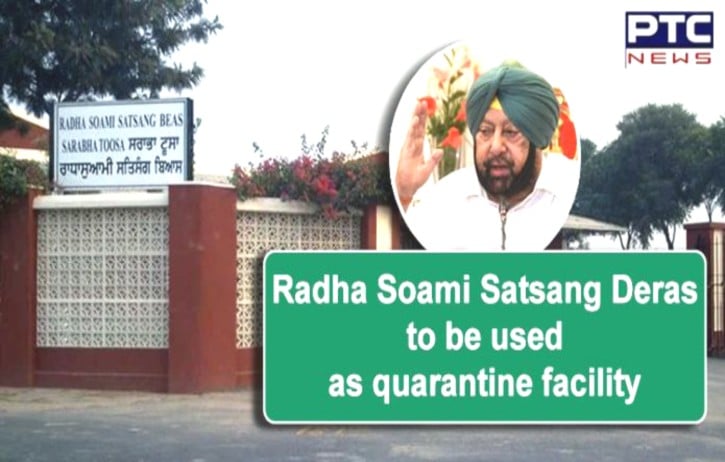
The Hindustan Times reported that:
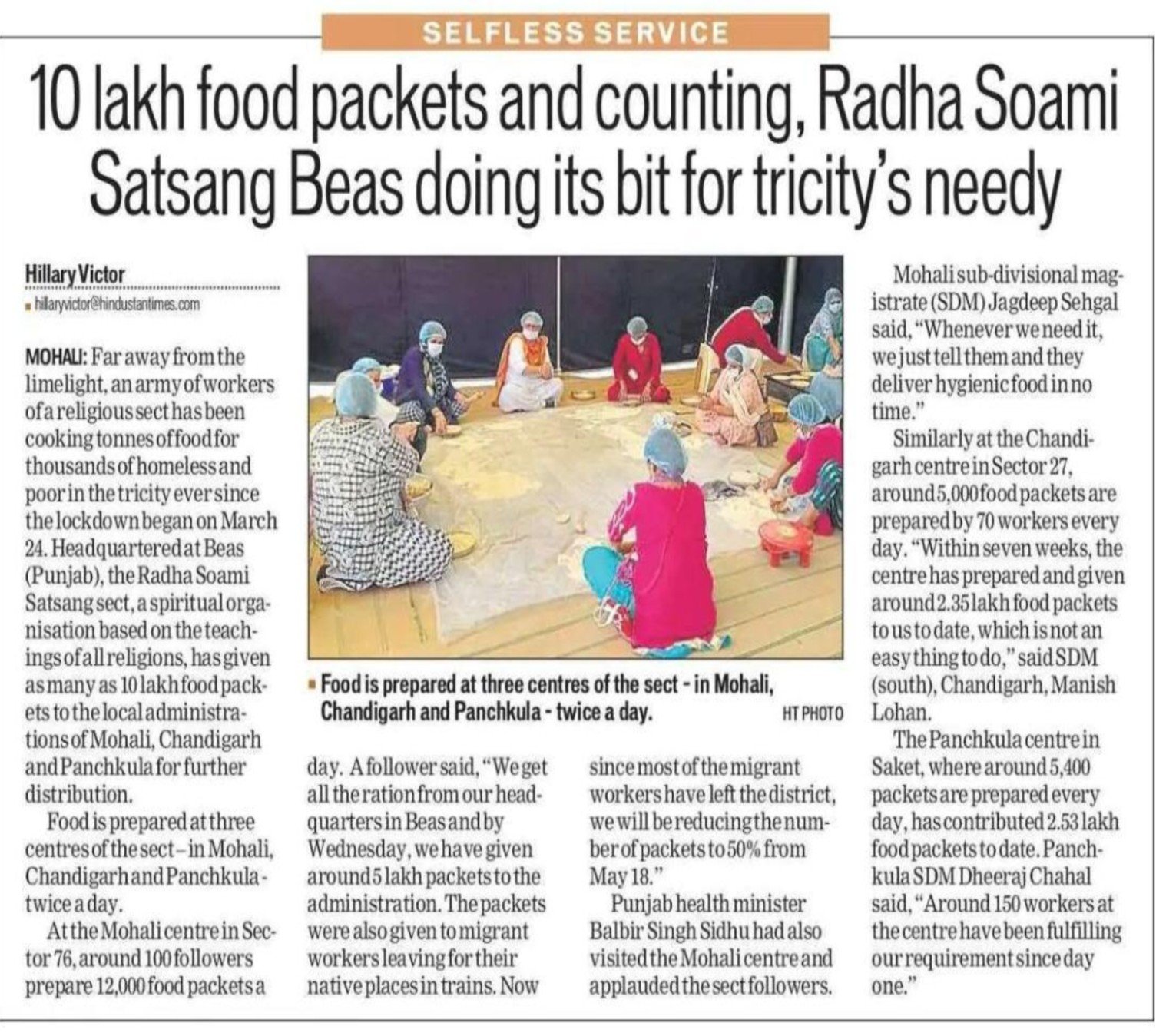
More readable text version.
The Tribune News Service reported that:
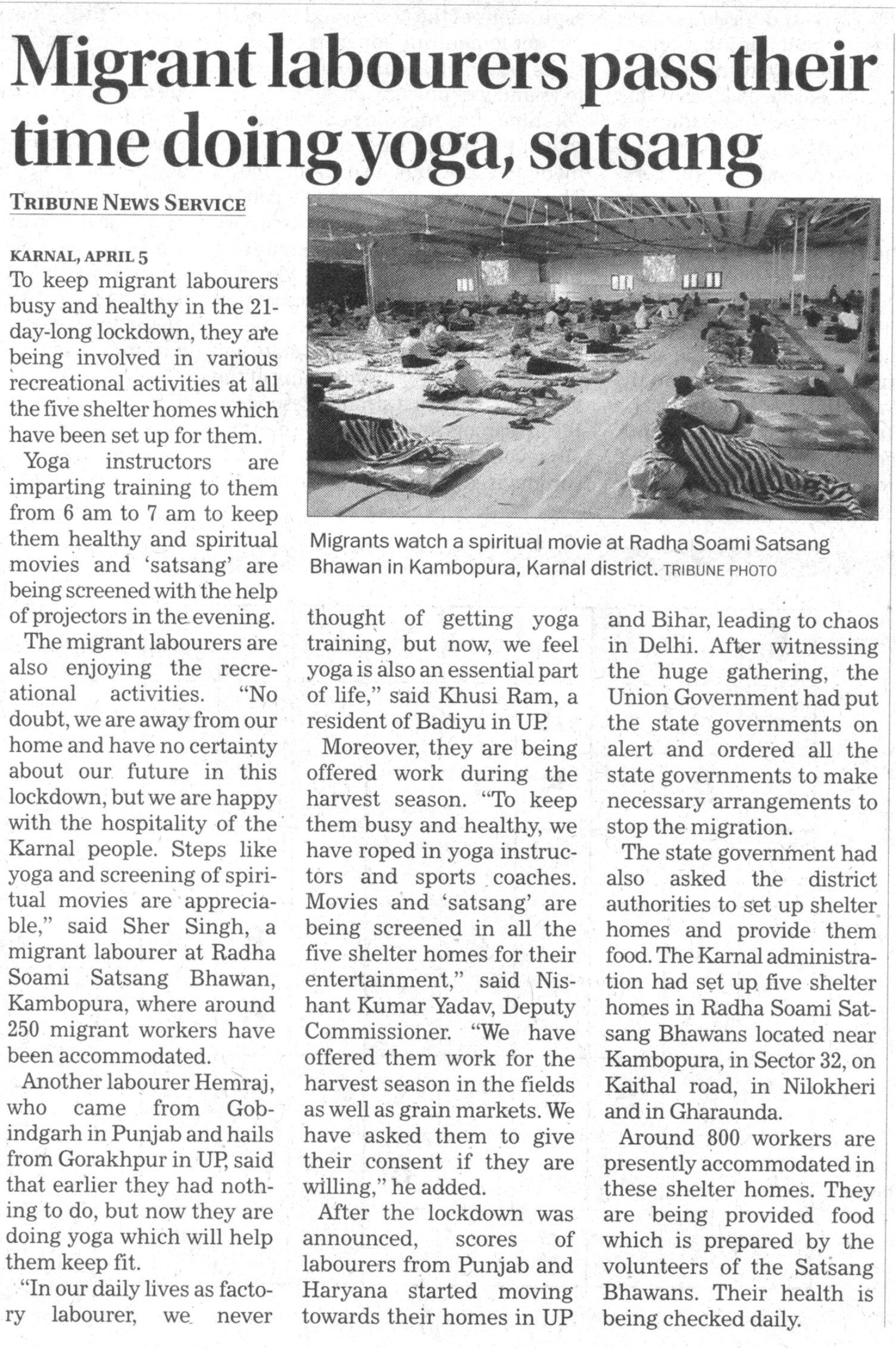
More readable text version.
COVID Care Facilities at Radha Soami Satsang Beas Centres — May 2020
Delhi 10,000 beds
Nagpur 5,000 beds
Ulhasnagar 1,000 beds
Mumbai 300 beds
The Coronavirus pandemic (COVID-19) outbreak in India has prompted Radha Soami Satsang Beas (RSSB) to make available all its facilities to the Government of India and the District Administrations. RSSB has provided food to the people rendered jobless due to the lockdown, as well as shelter to the migrant labourers and shed space to be used as quarantine centres for COVID patients.
In May, 2020, RSSB recognized the requirement for a large field hospital to serve the Delhi COVID-19 patients. The State of Delhi needed to prepare for a very serious outbreak. Accordingly, RSSB made available to the Government the entire religious meeting centre owned by RSSB in the Chhatarpur suburb of Delhi.
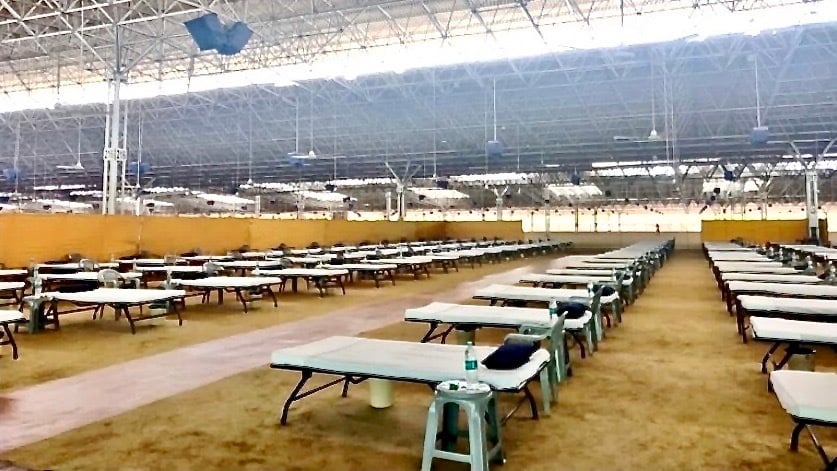
The property covers 300 acres of land of which 70 acres have been set aside for the care centre. This area includes a covered meeting area of 29 acres (the size of 22 football fields), 500 toilets, 450 bathrooms, and car parking for 1500 vehicles. A huge team, comprising volunteers from RSSB, government staff, and members of the Indo-Tibetan Border Police Force (ITBP), created a comprehensive care facility in record time. The floor was covered by RSSB in vinyl to enable hygienic cleaning. The Government installed 18,000 tons of air-conditioning to cool the area.
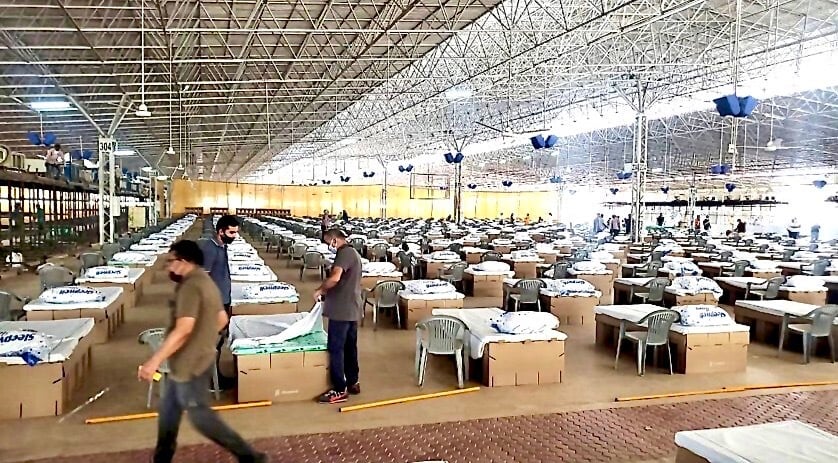
One hundred enclosures have been constructed with 100 beds each. The beds are spaced five feet apart. Each bed has been provided with a small cupboard, stool, dustbin, and toiletry kit. Included in the bed count are a large number of biodegradable beds manufactured from cardboard, each of which will be discarded after a single use and replaced by a new one. Oxygen support is available at 10% of the beds. The Centre will have two sections – one for asymptomatic patients who have tested positive for the virus and one for the patients who are suffering symptoms. The facility was created by the District Administration with full support of the ministry of home affairs on an emergent basis.
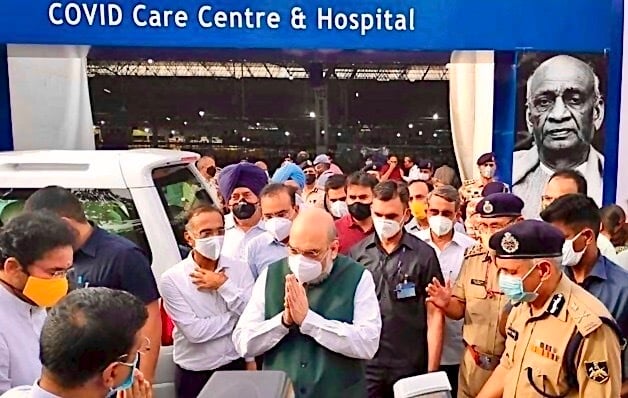
The facility has been named “Sardar Patel COVID Care Centre and Hospital”. With the intent to evaluate the suitability and adequacy of the arrangements, it was earlier visited by the Honourable Home Minister of India and Honourable Chief Minister of Delhi on 27th June, 2020.
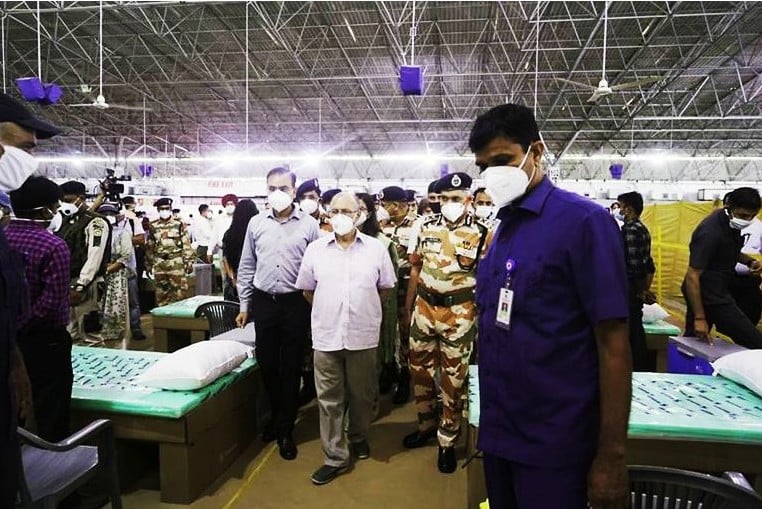
The facility was inaugurated by Mr. Anil Baijal, Honourable Lieutenant Governor of Delhi on July 05, 2020. After the inauguration, the entire facility including the availability of beds, oxygen cylinders, concentrators, ventilators, ICUs and medical staff was reviewed by the Honourable Lieutenant Governor.
The centre will be staffed by the ITBP and the Indian Army. More than 1,000 doctors, nurses and paramedics of the ITBP and other Central Armed Police Forces, plus 1,000 paramedics and security staff, will attend to patients when it is fully operational. More than 75 ambulances will also be deployed at the Centre.
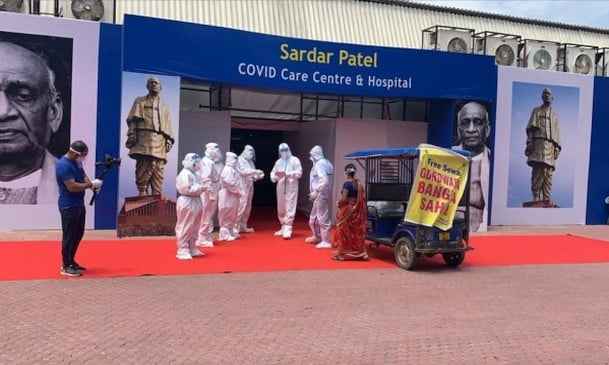
Patients and staff will receive three meals a day prepared on site in the facility’s industrial scale kitchens run by RSSB volunteers. Each patient will receive vegetarian food and vitamin supplements as recommended by the doctors. RSSB is providing all food and support services free of charge. One example that illustrates the enormous scale of the project is that three vegetarian meals a day will be provided for all the 10,000 patients and 2,000 health care workers. Meals will be served in disposable food-grade plates. Many of the healthcare workers will also be accommodated on the campus.
This facility, having largest number of beds, in one single campus, requires speed of management as well as analysis and operations that make it imperative to explore the extensive use of information technology. Accordingly, over 350 computers and 100 computer tablets will ensure that all processes from admission to discharge will be recorded electronically, with nurses reports filed via the tablets. RSSB is proud to be associated with what is said to be the largest COVID-19 care centre in the world.
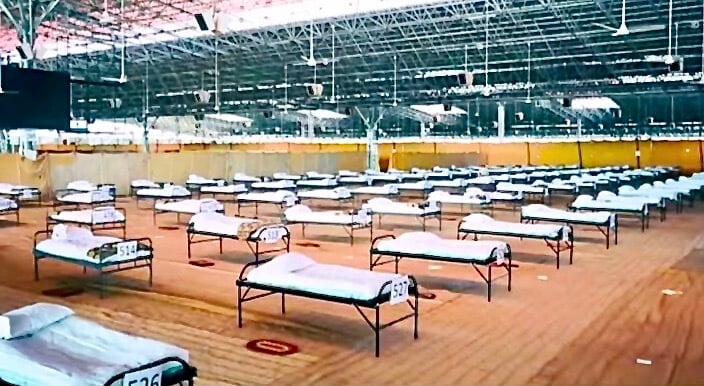
Appreciating the need of the country for large-scale management of COVID-19 patients, RSSB has already handed over its major religious meeting centres in Mumbai (Bandra) and Nagpur in the State of Maharashtra to the respective District Administrations to manage COVID-19 patients.
RSSB has offered its premises at the city of Nagpur (Maharashtra) to the Nagpur Municipal Corporation (NMC) where they have set up a 5000-bed ‘COVID-19 Care Centre’ in an area of 600,000 Sq. Feet out of the total area of 11,40,000 Sq. Feet. The NMC plans to use this facility for screening and quarantine.
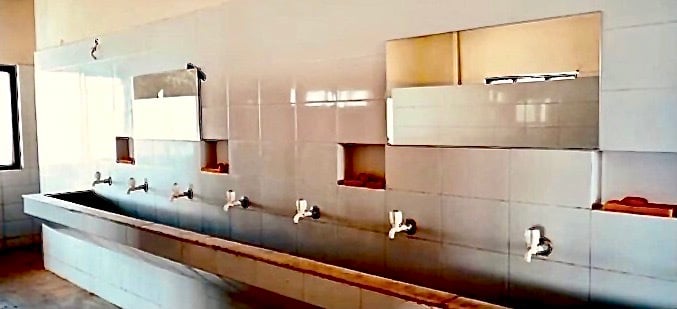
Apart from providing its premises and infrastructure, RSSB has made arrangements for matting, barricading, compartments and siding. Drinking water facilities along with meals for the patients, medical, paramedical staff, and the concerned officials will also be provided by RSSB 24/7. Arrangements for the housing of medical and paramedical staff, police personnel, and government employees engaged in sanitation work have also been made at the premises itself. NMC has put in place the required testing facility at the premises where apart from checking temperatures, examination of blood samples will also be conducted.
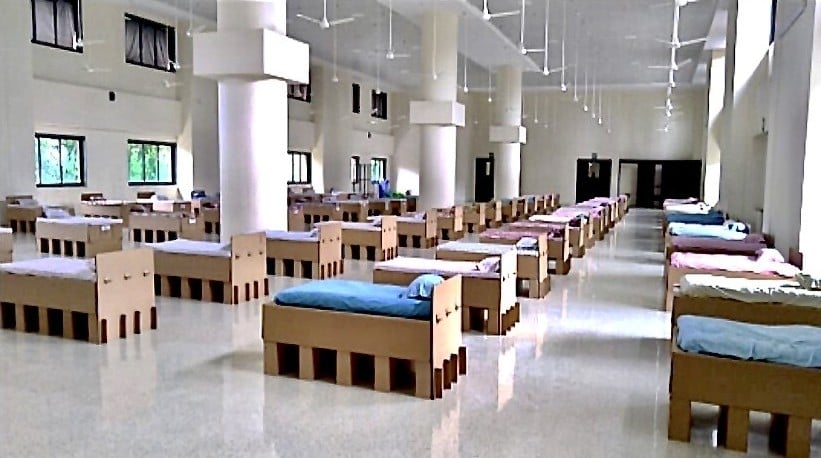
RSSB has also made available its facility at Bandra (Mumbai), which is a fully finished multi-storied building which has all the amenities such as lifts, fire-fighting system, and separate toilet blocks for gents and ladies on each floor. The Corporation has set up 60 beds on each of the five floors (57,000 Sq. Feet) which makes 300 beds available for COVID-19 patients. This facility has been handed over to the Municipal Corporation of Greater Mumbai for setting up a COVID Care Centre. Similarly, 1000-bed COVID care facility is being set up in Ulhasnagar, District Thane, Maharashtra.
In addition, RSSB has offered to the Government its religious meeting centres at major cities all over India for setting up care facilities for COVID-19 patients. Premises are being made available when requests are received from the Government.
For more information you can click on the two URLs below:
Aerial view of the Radha Soami Satsang Beas COVID Care Centre at Chhatarpur, New Delhi.
The Lieutenant Governor of Delhi, Mr. Anil Baijal, inaugurating the Sardar Patel COVID Care Centre at Radha Soami Satsang Beas, New Delhi, on July 5, 2020.
Radha Soami Satsang Beas
Activities during the Covid-19 Second Wave – May 2021
On May 7th, 2021, a record 414,188 new daily infections were reported. The number had almost tripled within the time frame of a month. A second wave of the coronavirus has resulted in acute shortages across the healthcare infrastructure in the country. While a number of states imposed lockdowns to counter the spread, experts have warned of a potential third wave hitting the country before the end of the year. No single healthcare entity or government body has sufficient resources to face on its own the ever-spreading virus. With a population of 1.4 billion people, resources and logistics are severely stretched. This has prompted a number of charitable and religious organizations to step forward, and in partnership with the authorities, attempt to augment the existing infrastructure.
At Radha Soami Satsang Beas (RSSB) sewa (service) has always been one of the key tenets of its teachings. RSSB has offered the use of its centers across the country for the setting up of medical care, isolation centers, vaccination centers, logistical support, and food delivery. Building on its efforts during the first wave, the organization was able to quickly put into place procedures and policies that were developed in 2020. At these centers RSSB offers a clean environment that also can be enhanced to be medically sterile, apart from offering basic infrastructure of bathrooms, toilets, and open spaces. The sevadars (volunteers) at these centers provide round the clock administrative support, food, tea, and allied services to both medical personnel and patients free of cost. Currently there are over fifty Covid care centers in various stages of being operational and with more in the development phases.
The following article provides a glimpse into the services being provided by RSSB at its centers across the country, and is only a small indication of the devotion and dedication of the sevadars who, on a daily basis, have put their own wellbeing at risk to help shoulder the pressures being faced by each section of society.
RSSB Bhati, New Delhi
The Sardar Patel COVID Care Centre
During the first wave in the Spring of 2020, the Government of Delhi had established the Sardar Patel Covid Care Centre at the RSSB Bhati premises in South Delhi. The Centre had 10,000 beds and facilities to handle up to 10,000 patients on a daily basis. The main facility is 1,700 feet long and 700 feet wide, roughly the size of 20 football fields, and has 200 enclosures with 50 beds in each and is fully air-conditioned. It was closed in February of this year as the caseload had dropped. The facility has now been reopened to give medical support for the recent challenge of this unprecedented surge in coronavirus cases.
The Ministry of Home Affairs has designated the Indo-Tibetan Border Police (ITBP) as the nodal agency for operations. The facility has 500 oxygenated beds for Covid-19 patients, with a plan to increase this effort in the shortest possible time. There is walk-in admission at the Centre for patients who are Covid positive and have oxygen levels above 85. Although at the moment there is an acute shortage of oxygen in the country, it is planned to supply 700 MT of oxygen each day for all of New Delhi, which will allow us to create 2,000 beds at the Bhati Centre with oxygen. Further, 192 ICU beds are being arranged at the facility, of which 150 beds would be equipped with ventilators.
Patients are admitted to the Centre after a physical examination, and a kit will be provided to them on admission. All medical treatment, medicines, food, and other amenities are being provided free of cost. Services of a stress counselor are also being provided at the Centre. Approximately 300 RSSB sewadars are providing round the clock support in preparing and providing food and undertaking other support services free of cost for all the patients and healthcare workers.
See the link below for an aerial view of the RSSB Centre at Bhati, New Delhi.
https://www.youtube.com/watch?v=QV7iUy52zdo
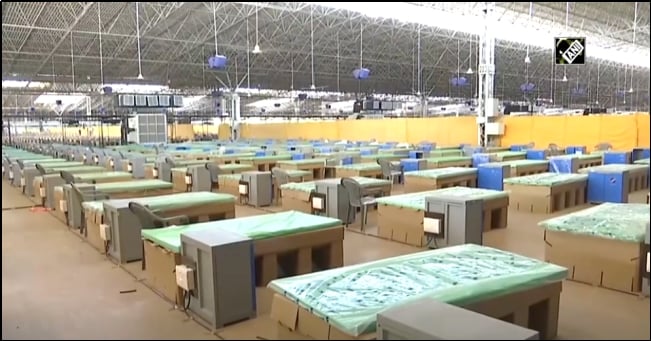
Disposable beds made of reinforced cardboard are used to reduce the risk of contamination after use by active Covid patients.
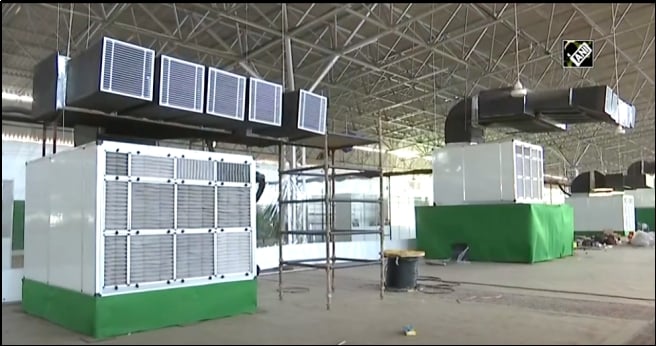
Part of the air conditioning/cooling system.
Vaccination Centres
RSSB Pusa Road Vaccination Centre, New Delhi
Covid-19 vaccination drives have begun across the country. In New Delhi, BLK-Max Super Speciality Hospital launched one of India’s largest vaccination centres at the Radha Soami Satsang Beas, Pusa Road Centre. Chairman and Managing Director of Max Healthcare, Mr. Abhay Soi said, "This is one of the largest vaccination centres in India. Our target is to vaccinate 10,000 people in a day."
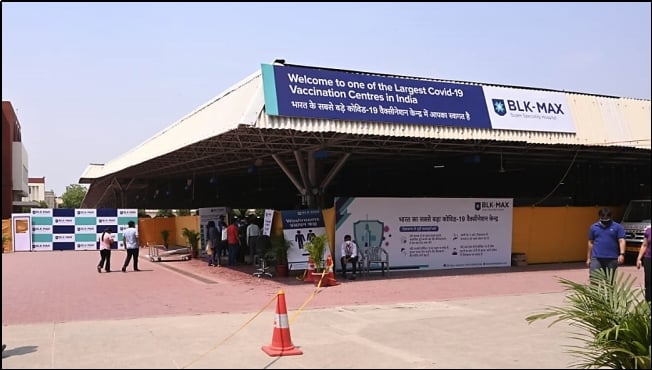
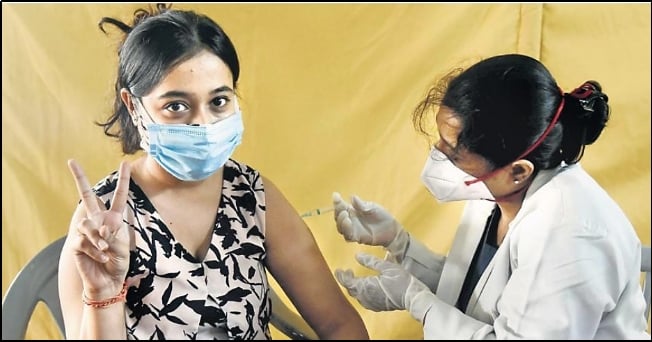
Getting her first vaccination at the Radha Soami Satsang Beas Vaccination Centre at Pusa Road, New Delhi.
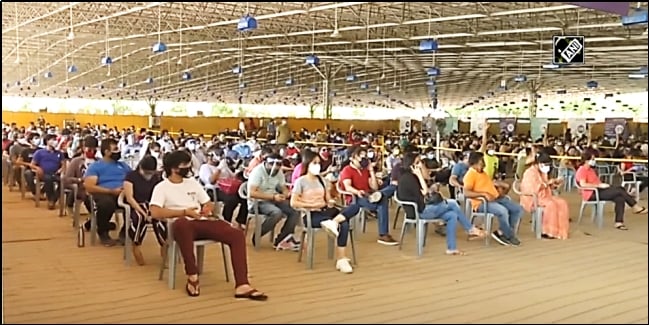
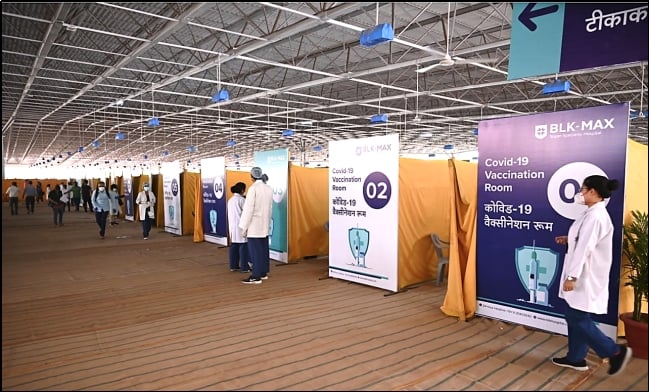
RSSB Vaccination Centres Planned
In addition to the RSSB Pusa Road centre, RSSB sewadars are actively assisting the local authorities in undertaking vaccination drives at over 400 RSSB Centres in many states throughout India, including Uttar Pradesh, Himachal Pradesh, Haryana, and Punjab. To date over 224,000 vaccinations have been given.
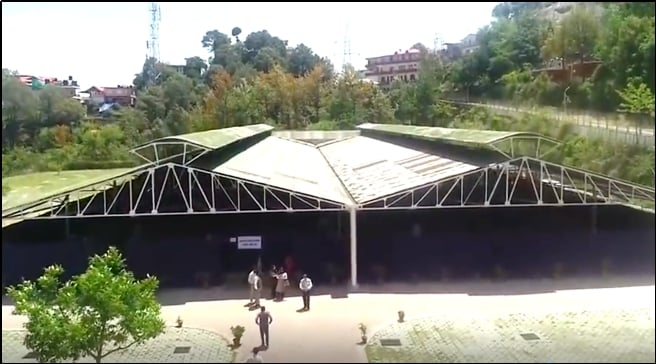
RSSB Solan Vaccination Centre, Himachal Pradesh.
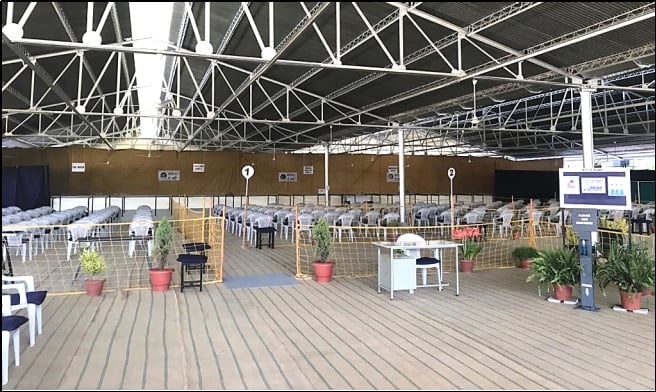
RSSB Solan Vaccination Centre, Himachal Pradesh.
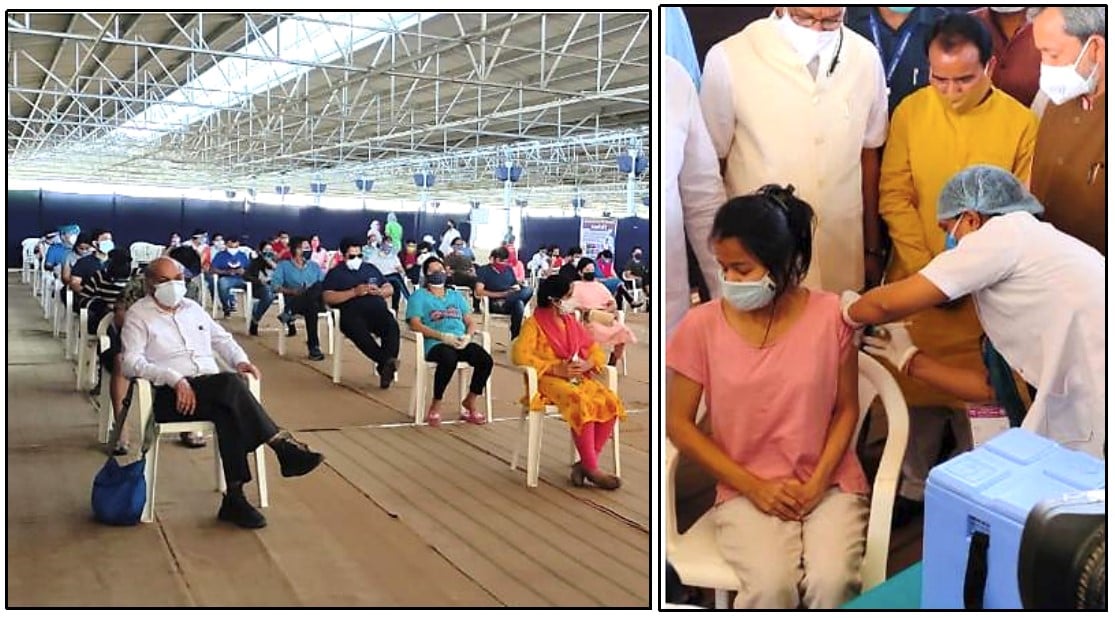
RSSB Dehradun Vaccination Centre, Uttarakhand.
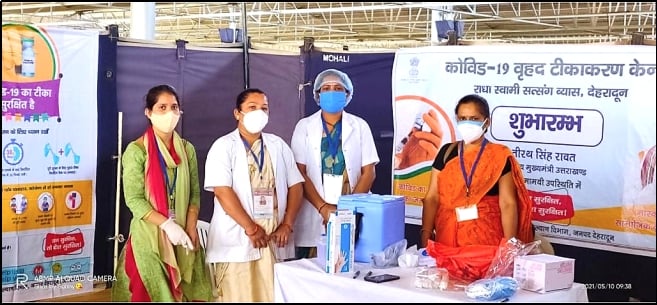
RSSB Dehradun Vaccination Centre, Uttarakhand.
RSSB Covid Care Centres
RSSB Jaipur Covid Care Centre, Bilwa, Rajasthan
Amid the surge in COVID-19 cases, the Jaipur Development Authority has established Rajasthan’s largest COVID care centre at Radha Soami Satsang Beas, Jaipur Centre at Bilwa, located 24 km from Jaipur on the Tonk Road. The facility has 768 beds. The number of beds can be increased to 8,000 as needed. Owing to a shortage of oxygen supply, the administration will provide only 50 beds with oxygen facilities, but will increase the number once a supply of more oxygen cylinders is received.
Officials said this large Centre is special because it already has power supply, fans, hundreds of toilets, closed circuit television cameras, and a very large kitchen where fresh food can be prepared for the patients and staff.
The Medical and Health Department has appointed teams of doctors, nurses, and paramedical staffers, which will be available round the clock at the centre. The Jaipur Greater Municipal Corporation and the police will help the JDA manage the centre. The RSSB management will provide drinking water, breakfast, lunch, dinner, and tea to patients and attendants at the centre. Moreover, RSSB has also committed to providing ayurvedic decoctions to patients to boost their immunity.
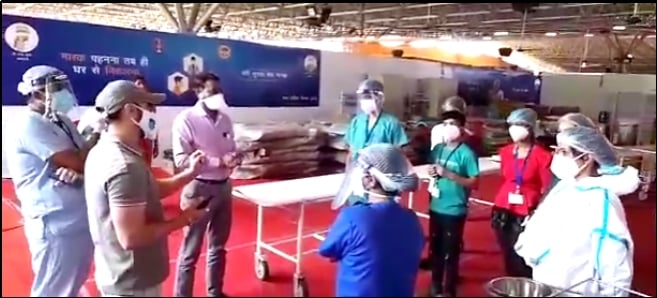
Jaipur Covid Care Centre, Bilwa, Rajasthan
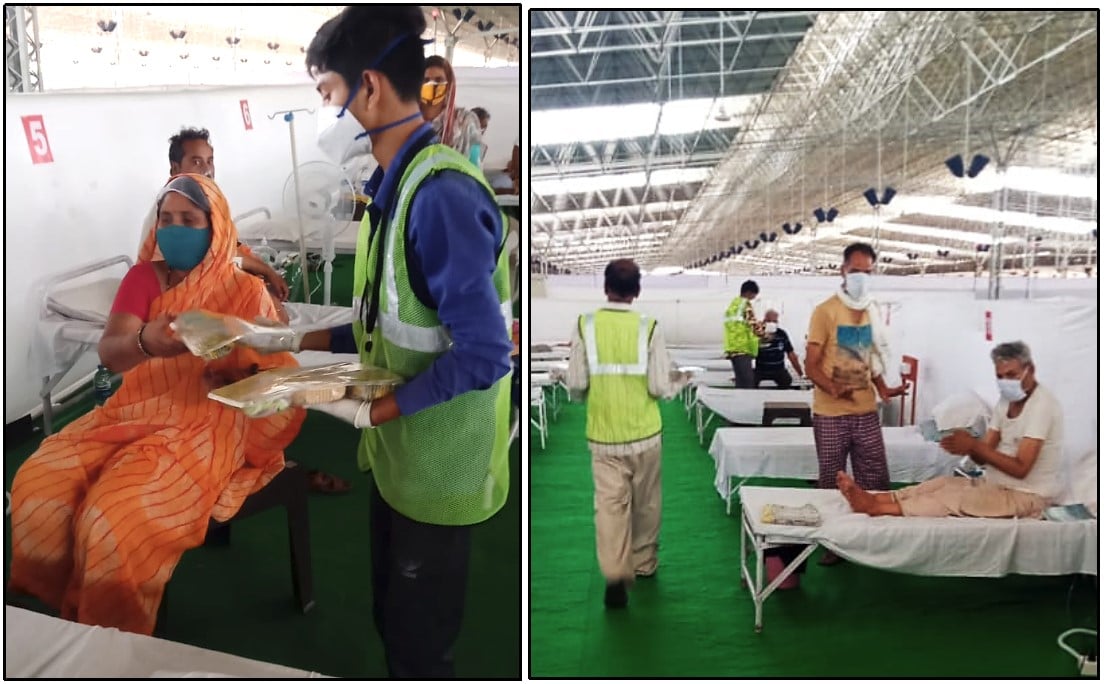
RSSB Indore — Ma Ahilya Covid Care Centre
The Ma Ahilya Covid Care Centre has been established at the Radha Soami Satsang Beas Centre Indore campus on Khandwa Road, situated on over 45 acres of land. The facility has 1,200 beds, with 125 beds having oxygen concentrators for Covid patients. The medical arrangements are managed by the State Government of Madhya Pradesh with joint support from Apollo Hospital, Bombay Hospital, Choithram Hospital and Medanta Hospital. Patients who are advised home isolation but don’t have space or facilities at home will also be accommodated here. Patients will be allotted cardboard beds that can be easily disposed of after the patient is discharged. This will prevent contact and diminish the chances of spreading the infection. The long-term master plan includes expanding the number of beds to 6,000 if required.
RSSB is supporting the effort by providing breakfast, lunch and dinner at no cost for all the patients, medical staff, and administrative staff of the government. The Centre has a large kitchen equipped with facilities to prepare food for thousands of people. On average, 150 sewadars are involved in the daily preparation of 2,500 food packets which are served with tea.
This large Covid facility is the second largest in India after the RSSB Bhati facility in Delhi. The Indore Covid Care Centre was established for the benefit of patients who do not have respiratory issues, but are in need of isolation under medical supervision. At the same time, beds in a High Dependency Unit are also available at the facility to stabilize patients' oxygen levels, in case of emergencies. If there are further complications, patients will be referred to the nearest dedicated Covid hospital.
Plans have been made to set up an in-house laboratory to conduct RT-PCR tests. Two in-house oxygen plants are also available, with equipment purchased via crowd-funding.
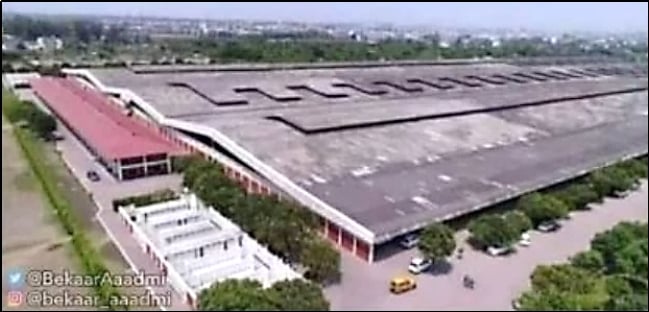
RSSB Indore Ma Ahilya Covid Care Centre
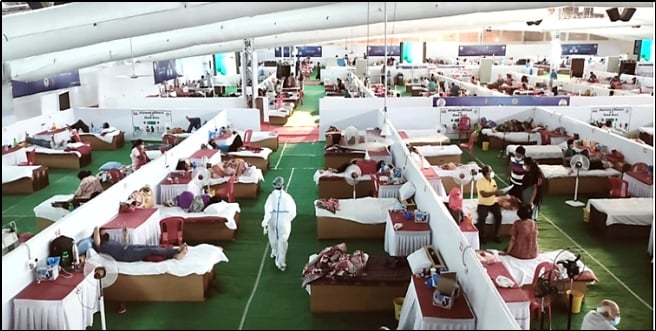
RSSB Baddi Covid Care Centre
A 190-bed extended Covid Care Centre has been created at the RSSB Baddi Centre to deal with the increasing cases of Covid-19 in the area. The large shed at the Radha Soami Satsang Beas Centre has been made available to house beds and other facilities for patients. The Centre borders an industrial belt, and the number of cases has been increasing, necessitating the urgent creation of a facility with beds sufficient to meet the area’s medical needs. A large number of industrial workers enter the area each day from the surrounding states of Punjab, Haryana, and Chandigarh, many of whom are already infected with the coronavirus. Trucks routinely come from states even further away like Maharashtra, Delhi and Gujarat. Such daily movement of workers coming from infected areas has made this industrial belt especially vulnerable to Covid.
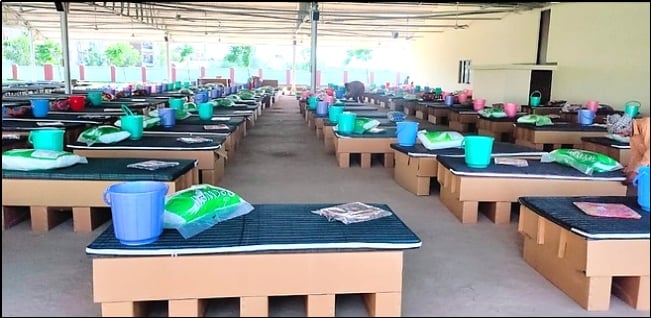
RSSB Ludhiana Covid Care Centre
Radha Soami Satsang Beas Ludhiana has converted their Satsang Centres on Chandigarh Road and Hambran Road into Covid Care Centres. Both Centres are now operational and have 110 beds each. Doctors and oxygen cylinders will be provided by the district administration. The electricity and all necessary facilities, including beds, quilts, soap, portable water, coolers, and other items will be provided to the patients and will be borne by RSSB. Food for patients and medical staff will also be prepared on the premises free of cost by RSSB sevadars.
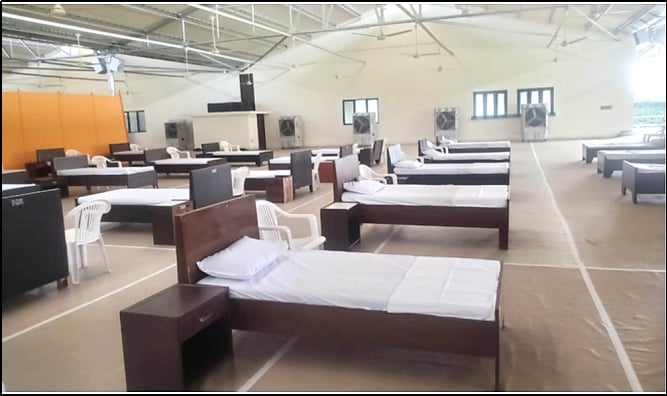
RSSB Covid Care Centre, Chandigarh Road, Ludhiana
RSSB Kathmandu, Nepal
Covid Isolation and Oxygen Therapy Centre
Deputy Prime Minister Ishwar Pokhrel has said that treatment of Coronavirus-infected people would be made at isolation centres in the large buildings available in the Kathmandu Valley. After inspecting the Radha Soami Satsang Beas Covid Isolation and Oxygen Therapy Centre, the Deputy Prime Minister telephoned the Chief Secretary, Dr Shankar Das Bairagi and Mayor of Kathmandu Metropolitan City, Bidhya Sundar Shakya, and directed them to make proper arrangement for running of isolation centres.
The RSSB Covid Isolation and Oxygen Therapy Centre is being brought into operation at Basundhara, in the capital city for the treatment of Covid-19 patients. On direction from the DPM, the Nepali Army has begun working to bring the centre into operation.
RSSB has provided its main building for the operation of an 88-bed isolation centre with oxygen therapy. Preparations have been made to extend the hospital up to 200 beds if required.
The KMC will ensure resources and infrastructures required for the isolation centre while the Nepali Army will take the responsibility of treatment, security, and management.
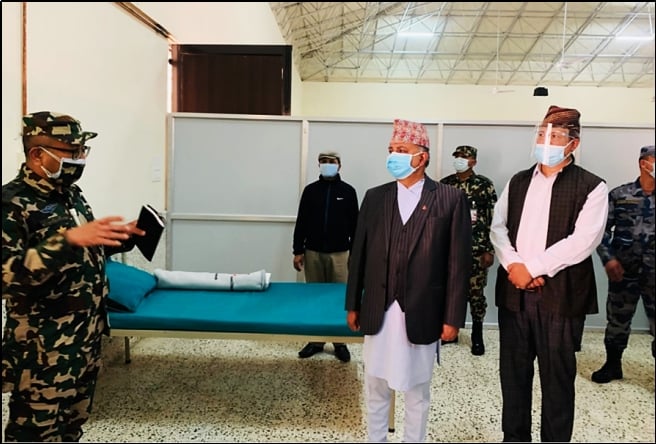
Deputy Prime Minister Ishwar Pokhrel visiting the Radha Soami Satsang Beas Kathmandu Covid Isolation and Oxygen Therapy Centre.
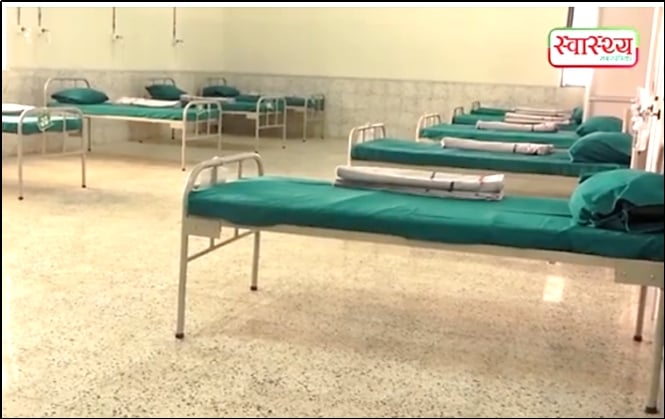
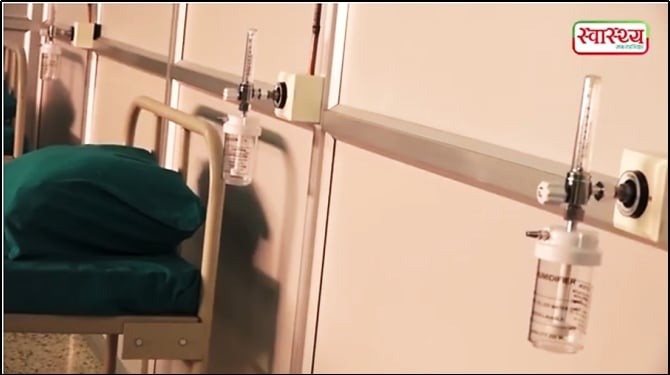
RSSB Continued Covid Response
RSSB continues to increase its response to the growing pandemic with additional Covid Care Centres throughout India. While the immediate plan is for about 40 additional centres, this number will continue to grow to meet the challenge. Some additional centres are pictured below. You can also refer to the RSSB Official website for more information at the link: https://rssb.org/covidpdf.html
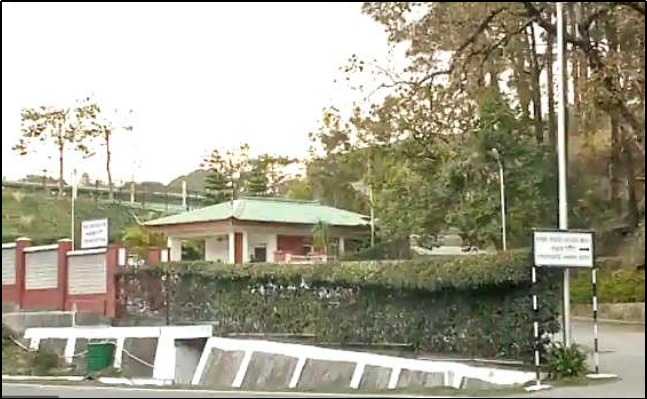
Paror Covid Care Centre — Chief Minister Jai Ram Thakur visited the Kangra district to inspect the 250-bed facility being established on the premises of the Radha Soami Satsang Centre at Paror. Arrangements are being made to provide additional 250 beds within the next 10 days. The capacity at Paror will be gradually increased to about 1,000 beds.
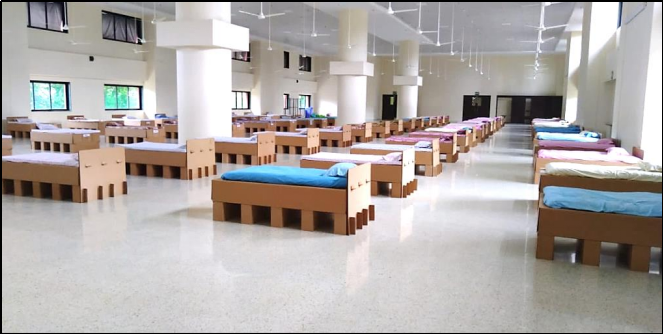
RSSB Bandra Centre — A 370-bed isolation centre has been set up by the local administration, with 20 beds supported by oxygen concentrators.
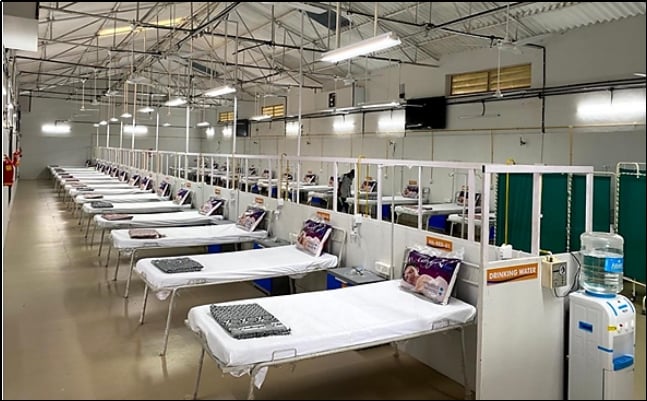
RSSB Navi Mumbai Centre — 408 beds isolation Centre has been set up by the local administration. The Isolation Centre also has 125 oxygen supported beds.
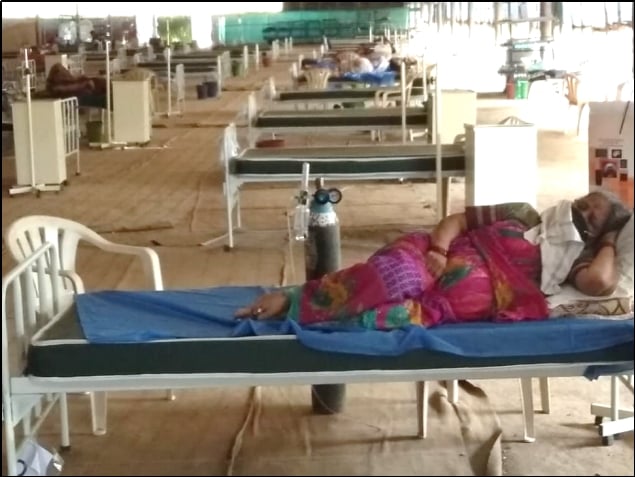
RSSB Ulhasnagar-I Centre — 300 beds isolation Centre has been set up by the local administration. The Isolation Centre also has 20 oxygen supported beds.
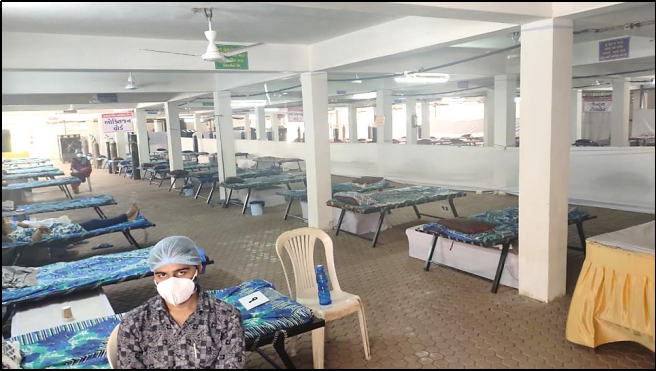
RSSB Surat Centre — The local Administration is in process of setting up a 100 bed Isolation Centre at RSSB Surat with medical supplies to be provided by the local administration. Of the 100 beds, 50 are supplied with oxygen. The entire facility is also air cooled.
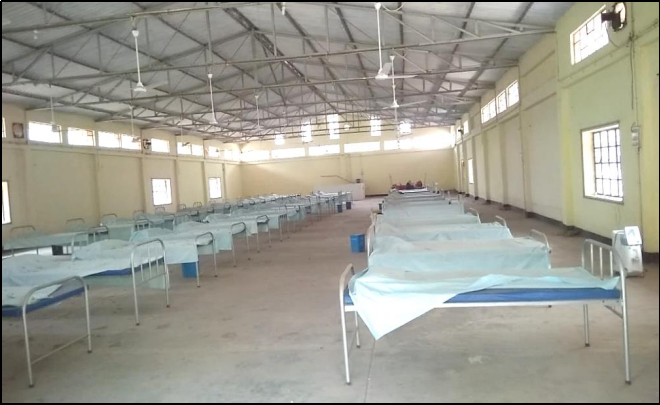
RSSB Patna Centre — 50 beds isolation centre has been established by local administration.
Providing Food During Lock-down Conditions
On request from local government administrations, RSSB is providing food to the authorities to help feed those in need during the lock down conditions at centres in Varanasi, Rudrapur, Chennai, and Raipur. This is in addition to the food being provided to patients and health workers at Delhi, Jaipur, and Indore. Every day approximately 15,000 food packets are being made available.
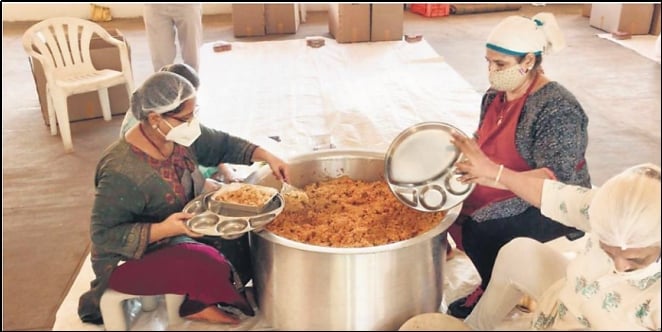
Sevadars from Radha Soami Satsang Beas Chennai prepare simple, healthy food like sambar and rice, different varieties of rice with pickle, or tomato rice. Around 18 sevadars prepare the food and pack it in disposable containers for delivery, free of cost. All the kitchen sevadars are equipped with hairnets, masks, and gloves, and have taken the RT-PCR test.
